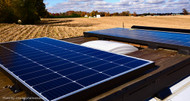DEBUNKING SOLAR MYTHS: PART 1
18th Nov 2022
Have you been interested in going solar, but have been on the fence ever since you read something controversial related to solar? Well, never fear, because in today’s blog we’ll be going through four of the most common myths related to solar. These myths include but are not limited to statements such as, “Solar Panels do not work on cloudy days,” “Solar Panels require too much maintenance,” “Solar Panels won’t work in the winter” and lastly, “The lifespan of Solar Panels isn’t that long.” If any of these have been holding you back from going solar, stay tuned as we’ll be myth-busting all of them. [If you don’t fall into any of these categories, be on the lookout for the 2nd part of this blog series!]
Myth #1: Solar Panels Won’t Work on Cloudy Days
Contrary to popular belief, solar panels will still perform on cloudy and overcast days. The reason being is that the sun’s rays still penetrate through the cloud cover, which still allows your solar panel to absorb energy and then convert it into clean power. The misconception, however, is that although your panels will still be able to absorb and convert solar rays into energy, they’ll be 10-15% less efficient than they would be in peak conditions. With a drop in efficiency, comes a drop in power output. Nonetheless, you can still use panels on cloudy days.

Myth #2: Solar Panels Require Too Much Maintenance
Now, let’s look at a very common myth, especially for those who are brand new to the solar world. Many think that solar panels require specialized maintenance and cleaning procedures, when really, it’s a lot easier than that. In terms of maintenance, it’s recommended that you examine your wiring and junction boxes for signs of malfunctioning equipment. In terms of cleaning, all it takes is soap, water, and a microfiber cloth and with a little elbow grease, your solar panels will be able to draw in the maximum sunlight possible.
Myth #3: Solar Panels Won’t Work in the Winter
This myth goes hand in hand with what we talked about before. During winter, solar panels and solar energy become more prevalent due to the weather. Batteries lose their charge faster due to the colder temperatures, so you will need something to maintain their charge. Solar panels can still pick up the sun’s rays and convert them into PV energy, thereby generating clean power. It is recommended that you tilt your solar panels to a 60-degree angle for optimal performance. However, no matter the season or time of year, solar energy can still be used.

Myth #4: The Lifespan of Solar Panels Isn’t That Long
For this last myth, we’ve got more good news for all of you! Most solar panels can last for more than twenty-five years on average, and in that time, they will have already paid themselves off a couple of times over. This is due to improved manufacturing techniques and the long-lasting technology of today’s PV modules. Rest assured, that by going solar, you are making a sound investment for many years to come.
As we close out this blog, we hope to have cleared up any misleading information that is out there when it comes to solar. You’re now in a better position to consider going solar. However, if you’re still on the fence, in part 2 of this myth-busting series, we’ll be going over more solar myths to better inform you of everything solar-related.
